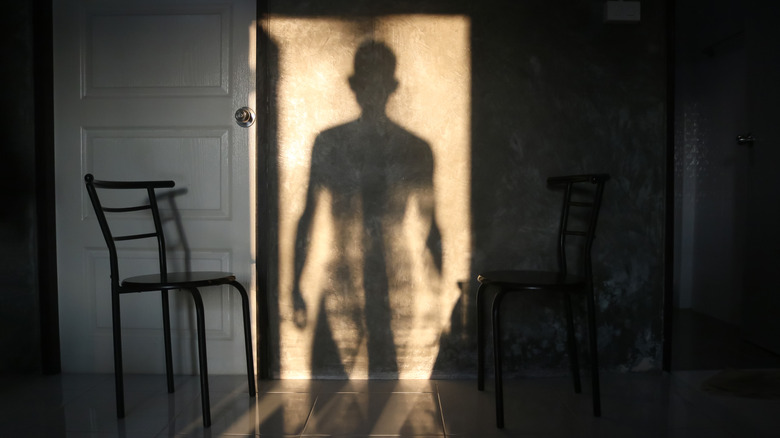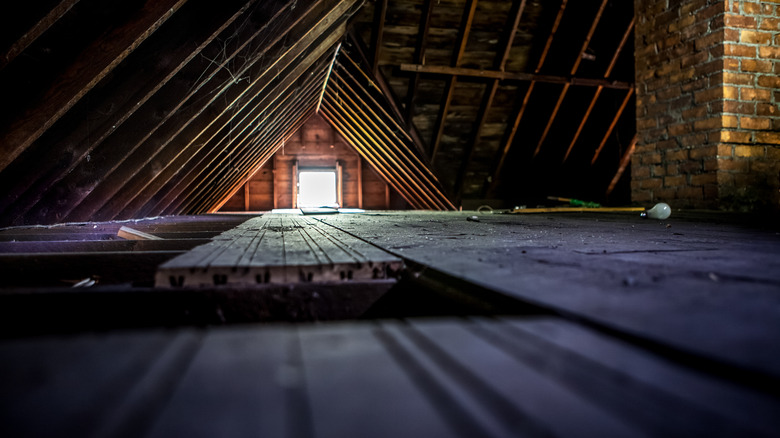Crime Secrets From Executive Producer Of Phrogging: Hider In My House - Exclusive
We've all been there: You reach for something in your kitchen, only to find it's not where it should be. Or instead, you walk into the bathroom, only to find the cabinet door open when you remember it closed. Surely, incidents such as these are attributable to moments of absent-mindedness, right? Or could something else be afoot? Could there really be someone else living inside your home, occupying your space without you knowing they're there?
Speaking exclusively with Grunge, Jessica Everleth, executive producer of Lifetime's "Phrogging: Hider in My House" explains that strangers living inside a home without the occupants' knowledge happens far more often than many realize. So much so that there's a slang term for it: phrogging — as Urban Dictionary defines it, "a person secretly living in another person's home." It's pronounced "frogging" and the frog connotation comes about because people who engage in this activity "tend to 'hop' around from house to house, as a frog might do on a lily pad."
The first season of Lifetime's 10-part series covers just some of the scariest and most harrowing examples of phrogging. According to Everleth, series producers uncovered some 300 examples of the crime while conducting their research. What's most important to note: Phrogging is not just an urban legend. Phrogging is real, and it could happen to you. Worst of all, you may never even know it.
Phroggers tend to hide in attics, basements, and crawl spaces
As "Phrogging: Hider in My House" Executive Producer Jessica Everleth also notes, signs of phrogging tend to start slowly. Often, those who experience phrogging often think their home might be haunted rather than what at first might seem far more unthinkable: an actual stranger is occupying their space, only emerging when they're not around. And as she goes on to explain, phrogging cases are often discovered "as things go missing and items disappear, only to later reappear." Think of that the next time you can't find your keys.
In 2008, for example, a Pennsylvania family discovered a 21-year-old man living in their attic, eating their food, stealing money, and even wearing their clothes, according to ABC News. The dangerous interloper was only discovered when footprints were found leading up to the attic where the suspect had been allegedly hiding for a week.
When this happens, it can cause extreme distress on the part of those who live in the home. "The homeowners and occupants feel like they're going crazy," Everleth continues. "It was surprising to hear how many people believed that they had a ghost rather than an intruder was living in their midst."
Sometimes phroggers target the home; other times, they target the occupant
Everleth also says those who engage in the crime of phrogging are sometimes motivated by the house and space itself, or simply "a place to live rent free and gain access to the occupants' things such as food or clothing," she says. Sometimes, though, the person who owns or rents the home is the target instead, in what Everleth likens to stalking.
Other times, owners of vacation homes or places where they may only live part of the time arrive to find that strangers have taken over, according to an A&E True Crime Blog post on the phrogging phenomenon. In a phrogging-like incident, in 2017, an estranged husband, still living with his wife, toyed with her from inside her own home, making her believe there'd been a robbery or perhaps worse, as her underwear and jewelry turned up missing and her car tires were slashed. Her husband was eventually identified as the culprit.
Some phroggers are never caught
In instances where phroggers are caught, many face jail time, explains Everleth. Many phroggers, though, are never caught, such as in 2012, when a woman found a man who she ended her relationship with more than a decade earlier living in her attic. Once discovered, the man got away before police could arrive, according to Yahoo! News. Before the unwanted intruder was discovered, the South Carolina mother of five simply thought she had some serious "poltergeist stuff going on," or maybe an animal, as she and her family heard bumps in the night and as nails started to pop out from the ceiling.
No matter what, those who experience phrogging in their own home live with residual trauma and as a result, many do not feel safe in their own home, according to Everleth.
Instances of phrogging should be taken seriously, Everleth adds. Those who suspect they may have a phrogger in their home should immediately "get out and call the police," she says. A preview of "Phrogging: Hider in My House" is available to watch now via My Lifetime.
Phrogging: Hider in My House premieres Monday, July 18 10/9c on Lifetime



